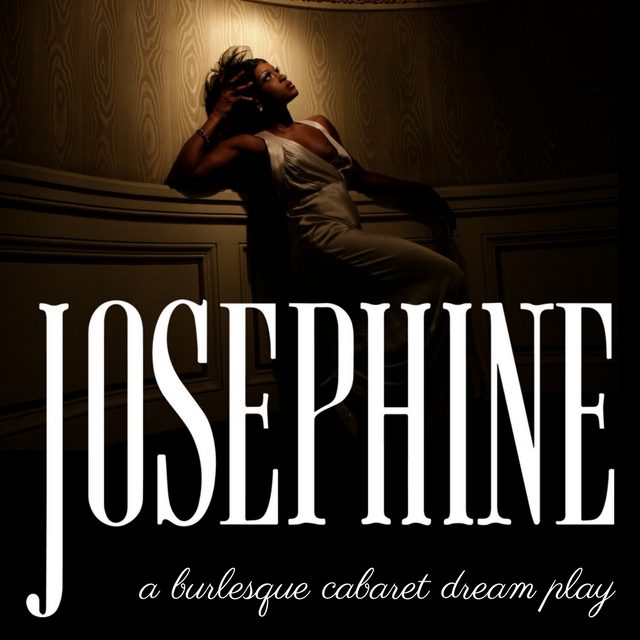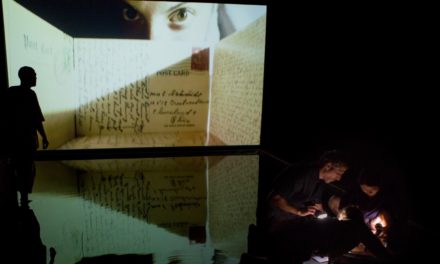They bill this as a burlesque cabaret but it goes far beyond that form because it actually tells us of the entire life of this remarkable Afro-American woman, played by Tymisha Harris. Harris does not really imitate Josephine but rather captures her multiple styles of dance and singing, various forms of theatricality and the different creative moments in her life as she evolves from the poor areas of St. Louis, Missouri through several marriages until she finally accepts an invitation to Paris to perform in the “Revue Nègre” in 1925. That move to France will change her life.
The show opens on a space that suggests a backstage dressing room with glitzy garments draped over the furniture and a screen where the shadow of the actress is outlined as she makes her discreet changes to topless costumes for the Revue Nègre in Paris. Baker, with her long lithe body, and the magic lighting that casts highlights on her hair sings her signature French song J’ai Deux Amours, Mon Pays Et Paris then she invites us into her life as she begins the fabulous tale of her transformation and the excitement that propelled her on until her death in 1975.
All the singing and dancing styles are captured with much grace and passion and lots of swing and bounce in the earlier days that show how the Parisian audiences were fascinated by this black performer, transformed into a “jungle” creature doing her famous banana dance with her banana belt swinging around her hips. This was also a sign of the colonial based racism that penetrated all French life at that period but she then shows us how she rose above that vision and became the toast of Paris, met all the famous artists and writers of the prewar and later the postwar period, had relationships with women and men (the divine Frieda Kahlo was one strong moment). She refined her performances to produce some exquisitely beautiful moments on the stage dressed in magnificent glowing gowns as her hairstyles changed to suit each period indicating all the attention paid to the precise historical reconstitution of her appearance.
Harris’ performance as the toast of the city then enters into the period of the German occupation of Paris when she takes us into her world of the French resistance–a chance meeting with Herman Goering was a shocker and then her troubled relations with racism in the United States that keeps her away from the country and that she constantly mentions. She did, however, accept Martin Luther King Jr’s Invitation (1963) to take part in that Washington Civil rights March and the creation of her own “rainbow tribe” of twelve adopted children which transformed her image even more.
Among all the great numbers, several were highlighted. The Bob Dillon Times Are A Changin’ that Baker interpreted in her own way, adding to this show a contemporary political note about not putting up any walls. And then a deeply moving rendering of Strange Fruit, the Billie Holiday song about lynchings in the south and the site of those rotting dead bodies swinging from the sweet-smelling magnolia trees. A brilliant moment that captured the humanitarian engagement that Josephine came to signify as well as showing us the great musical quality of Tymisha Harris’ voice as the singer captured the tortured soul of Billie Holiday.
In the middle of all this Fringe fever, the show Josephine, A Burlesque Cabaret Dream Play creates a special moment all its own that is uplifting and truly inspiring. Don’t miss it.
Featuring Tymisha Harris (performer and choreographer), Michael Marinaccio and Tom Kimbro, Dynamite Lunchbox Entertainment, Orlando, USA
Performances are at the Academic Hall
Saturday, June 16, 9:00 pm
Monday, June 18, 7:30 pm
Wednesday, June 20, 8:30 pm
Friday, June 22, 10:30 pm
Saturday, June 23, 4:30 pm
This article originally appeared in Capital Critics’ Circle on June 16, 2018, and has been reposted with permission.
This post was written by the author in their personal capacity.The opinions expressed in this article are the author’s own and do not reflect the view of The Theatre Times, their staff or collaborators.
This post was written by Alvina Ruprecht.
The views expressed here belong to the author and do not necessarily reflect our views and opinions.


















